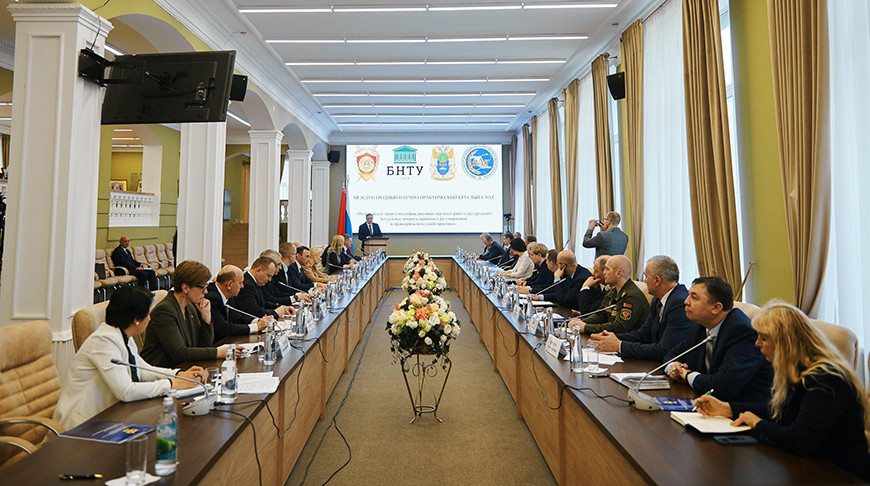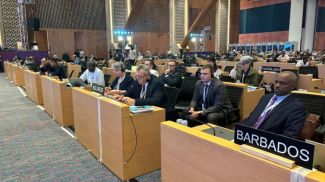
Photo courtesy of Belarusian National Technical University (BNTU)
MINSK, 3 April (BelTA) – The training of top-qualification personnel plays the key role in forming the manufacturing potential, the economic potential, the intellectual potential, and the spiritual potential of Belarus. The country’s Prosecutor General Andrei Shved made the statement during an international science and practice roundtable session on topical matters concerning the legal regulation and law enforcement aspects in the preparation and defense of qualifying research papers (dissertations) at premises of Belarusian National Technical University (BNTU), BelTA has learned.
Andrei Shved said: “Our country boasts a high level of scientific and technical development. The training of top-qualification personnel plays the key role in forming the manufacturing potential, the economic potential, the intellectual potential, and the spiritual potential of the republic. The level of training of young specialists in higher education institutions depends on it. The quality of fulfillment of scientific and R&D programs by industry-specific and academic scientific research institutions also depends on it. It is important to remember it particularly this year that has been declared the Year of Quality in Belarus. Our state has formed the necessary legislative base that regulates relations in education and science. Organizational and legal foundations for the development and management of scientific activities have been created. A number of stimulating preferences, including tax preferences, are available and serve the same purpose. Programs are available to support young scientists and talented youths in addition to government programs meant to support scientific research and many other things.”
The official remarked that Belarus’ accomplishments in science are confirmed by official data about the high positions the country holds in various international evaluation systems. “At the same time Belarus’ Supreme Personnel Review Board sometimes has to deal with dissertations, which have passed all the preliminary evaluation stages, preliminary defense, and sometimes official defense, only to be declined later on. The prosecution service is in charge of overseeing precise and uniform application of legislation and cannot stay aside from problems of applying the legislation in the sphere of preparation and defense of qualifying research papers. Following recent instructions given by the head of state, we had to take a close look at the matter. We saw that the Supreme Personnel Review Board maintains the right and principled attitude. We will continue supporting this attitude within limits of our competence in the future,” the prosecutor general said.
Deputy Head of the Belarus President Administration Olga Chupris, Chairman of the Supreme Personnel Review Board Aleksandr Guchok, representatives of the State Security Committee, the Investigative Committee, the State Forensic Examination Committee, the National Academy of Sciences of Belarus, the Supreme Personnel Review Board, the Antimonopoly Regulation and Trade Ministry, the Internal Affairs Ministry, the Healthcare Ministry, and other government agencies took part in the event. Heads of Belarus’ higher education institutions also took part in the discussion. The prosecutor general said: “The training of scientific personnel has to become a matter of focused attention of university rectors and faculty deans. We are talking about the need to uphold principles at all stages of development of research papers. The prosecution service inspects various aspects of operation of educational institutions of all kinds. This year we intend to carry out a number of oversight inspections focusing on this matter.”
The roundtable session was held with a view to stimulating the proper preparation and defense of qualifying research papers (dissertations), preventing violations in the course of their preparation and development, improving and integrating Belarusian and Russian legislation in the field of science taking into account the opinion of government agencies, which are interested in the training of top-qualification scientific personnel.











